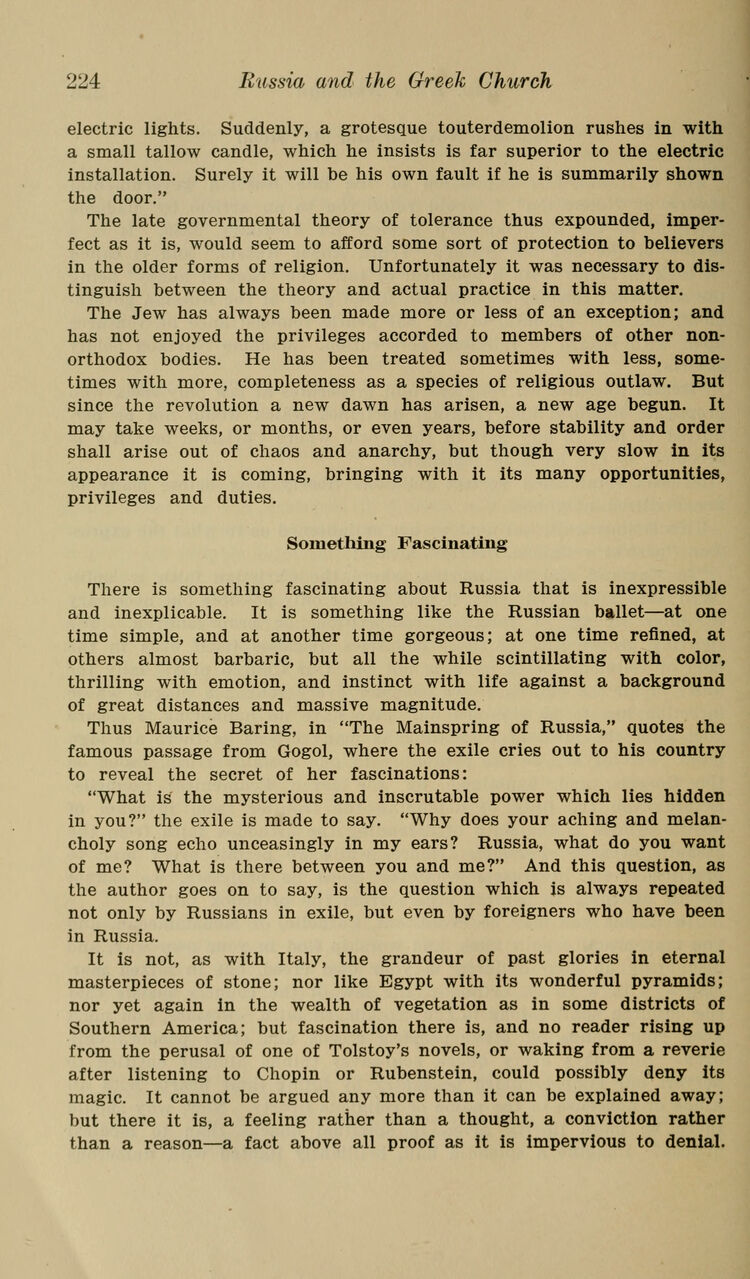
Full resolution (JPEG) - On this page / på denna sida - Russia and the Greek Church. The Rev. Elias Newman - Madame Novikoff and Mr. Stead - Something Fascinating

<< prev. page << föreg. sida << >> nästa sida >> next page >>
Below is the raw OCR text
from the above scanned image.
Do you see an error? Proofread the page now!
Här nedan syns maskintolkade texten från faksimilbilden ovan.
Ser du något fel? Korrekturläs sidan nu!
This page has never been proofread. / Denna sida har aldrig korrekturlästs.
224 Russia and the Greek Church
electric lights. Suddenly, a grotesque touterdemolion rushes in with
a small tallow candle, which he insists is far superior to the electric
installation. Surely it will be his own fault if he is summarily shown
the door."
The late governmental theory of tolerance thus expounded, imper-
fect as it is, would seem to afford some sort of protection to believers
in the older forms of religion. Unfortunately it was necessary to dis-
tinguish between the theory and actual practice in this matter.
The Jew has always been made more or less of an exception; and
has not enjoyed the privileges accorded to members of other non-
orthodox bodies. He has been treated sometimes with less, some-
times with more, completeness as a species of religious outlaw. But
since the revolution a new dawn has arisen, a new age begun. It
may take weeks, or months, or even years, before stability and order
shall arise out of chaos and anarchy, but though very slow in its
appearance it is coming, bringing with it its many opportunities,
privileges and duties.
Something Fascinating
There is something fascinating about Russia that is inexpressible
and inexplicable. It is something like the Russian ballet—at one
time simple, and at another time gorgeous; at one time refined, at
others almost barbaric, but all the while scintillating with color,
thrilling with emotion, and instinct with life against a background
of great distances and massive magnitude.
Thus Maurice Baring, in "The Mainspring of Russia," quotes the
famous passage from Gogol, where the exile cries out to his country
to reveal the secret of her fascinations:
"What is the mysterious and inscrutable power which lies hidden
in you?" the exile is made to say. "Why does your aching and melan-
choly song echo unceasingly in my ears? Russia, what do you want
of me? What is there between you and me?" And this question, as
the author goes on to say, is the question which is always repeated
not only by Russians in exile, but even by foreigners who have been
in Russia.
It is not, as with Italy, the grandeur of past glories in eternal
masterpieces of stone; nor like Egypt with its wonderful pyramids;
nor yet again in the wealth of vegetation as in some districts of
Southern America; but fascination there is, and no reader rising up
from the perusal of one of Tolstoy’s novels, or waking from a reverie
after listening to Chopin or Rubenstein, could possibly deny its
magic. It cannot be argued any more than it can be explained away;
but there it is, a feeling rather than a thought, a conviction rather
than a reason—a fact above all proof as it is impervious to denial.
<< prev. page << föreg. sida << >> nästa sida >> next page >>